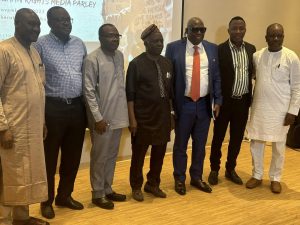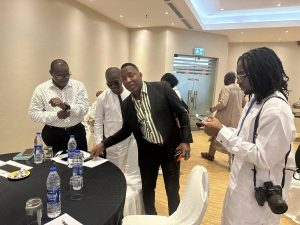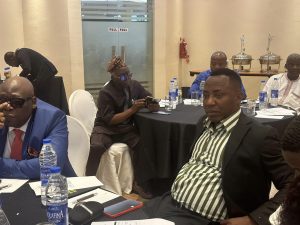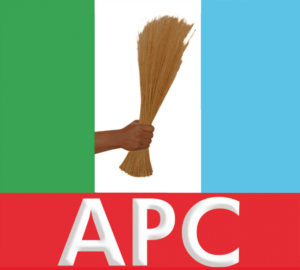Falana, Sowore, Rafsanjani, Richard Akinola, others stand up for human rights at Lagos media parley

*It’s important media continue to expose all human rights abuses – Rafsanjani
*Those who infringe on rights of Lagos people are now in power in Abuja – Sowore
*You have full constitutional backing to unleash your potentials as journalists – Alabi Williams
*We should not let down our guard – Richard Akinola
*Visit your area’s chief magistrate to know how she visits detention centres weekly – Falana tells Journalists
*Says if what happened under military happens now, ‘we won’t get justice’
*Even under Obasanjo, no time labour leader was brutalised like now – Amnesty International Director
By BASHIR ADEFAKA

“I hope all of us are aware of what is going on right now in Abuja where, as Sowore has mentioned, soldiers have been deployed to face peaceful workers protesting violence on their leader,” AI Country Director, Isa Sanusi
The Nigerian wing of human rights community rose on Thursday to the challenge of now rising human rights abuses in the country to say “never again will that be allowed to stand”.
Making this position at an Amnesty International Nigeria (AIN) Human Rights Medal Parley Agenda 2023, held in Lagos, were top human rights lawyers and civil society leaders, who agreed that the country could not be left in the hands of human rights law breakers unchecked and urged the media to step up their hard work in the direction.

Present at the event were Chairman Board of Trustees of the Amnesty International Nigeria, Mallam Auwal Musa Rafsanji; Human rights activist and pro-Democracy Campaigner, Mr. Omoyele Sowore; Activist and Veteran Journalist Richard Akinola, Guardian Newspapers’ Editorial Board Member, Mr. Alabi Williams; human rights lawyer and former Chairman, West African Bar Association (WABA), Mr. Femi Falana (SAN) and AI’s Country Director, Mallam Isa Sanusi.
Speaking outside his prepared welcome address at the event, AIN’s Chairman Auwal Musa Rafsanjani said “It is important for the media to continue to expose all human rights abuses in the country.”
He noted how security agencies continued to perpetrate human rights abuses such that, “When people cry out, government sets up a probe panel and nothing happens in the end.”
According to Rafsanjani, “The saddest of it was the EndSARS which government denied ever killing people but when evidences were brought to them, they shamelessly kept quiet. The media have been working under serious risks to lives of journalists.
“We are sick of having human rights abuses. We hope Tinubu’s administration will not rule Nigeria like a leader who does not care about the rights of the people.
“Protest is constitutionally guaranteed. You cannot stop people protesting. You will find out that those who are in government today were at one time in the past, themselves, on the street protesting. So, protesting is not a favour but rights,” Rafsanjani said urging the media to believe in the efficacy collaboration being build with Thursday’s meeting.
In his prepared speech, the Amnesty International board chairman said, “We note that there are some human rights abuses that have happened in recent times in Nigeria but got poor reportage. This gives rise to the need for Amnesty International and journalists and media practitioners to synergize to continue to advance the noble goals of human rights and justice in Nigeria.

“The purpose of this synergy is to provide journalists and media practitioners with a unique opportunity to engage directly with representatives from Amnesty International. Through this forum, we will provide answers to your questions and concerns, so that the media can gain insights into our human rights agenda and strategy. We are indeed looking forward to collaborating more with the media in our pursuit of fairness and justice for everyone throughout the country.”
He continued, “Another aim of this forum is to underscore the need for journalists and media practitioners to heighten the call for military and security agencies’ accountability, and to ensure that accountability is included in the military framework in Nigeria.
“Suffice it to note that the impact of the various human rights panels set up in the country is yet to be felt. For example, the reports of the army-led Special Board of Inquiry and the Presidential Investigative Panel set up in 2017 to review compliance by the armed forces with human rights are yet to be made public, despite Nigeria’s commitment to do so.
“The Judicial Panels of Inquiry set up by 29 States governments and the FCT, in line with the directive of the National Economic Council (NEC), in the wake of the #EndSARS protests in 2020, are yet to be implemented. Only Lagos state made its report public.
“To this end, we call on the media to follow up in ensuring that the reports of these panels are made public, and their recommendations implemented.
“In the coming days, we will be unveiling our Human Rights Agenda 2023 and sincerely hope journalists will give it the required attention. In the Human Rights Agenda 2023, we have, among others, analyzed the existing human rights framework in Nigeria and identified the gaps.
“We are hopeful that the media will give the identified gaps the required media coverage to ensure the human rights continue to be propagated in Nigeria, particularly in playing a leading role in ensuring that the National Assembly provides the necessary human rights framework to address the identified gaps,” the AI Nigeria’s chairman, Auwal Rafsanjani, said.
Those who infringe on rights of Lagos people – Sowore
In his intervention at the Human Rights Media Parley Agenda 2023, organised by Amnesty International, in Lagos, on Thursday, human rights activist Omoyele Sowore alerted that Nigerians should expect the worst human rights abuses at higher level in the country, especially now under the present administration of President Bola Ahmed Tinubu.

This, he said, was because those who are in power of Nigeria now are the same politicians, who infringed on the rights of Lagos indigenes, at will and nothing happened.
He said politicians are most breakers of human rights and that, “I’m talking about the current occupants of the Aso Rock and what is more difficult, real, is that they understand human rights to the point that they can violate your rights without you knowing it.
“These people who are in Aso Rock now used to be human rights fighters. Supposedly, they are the ones who fought for the democracy.
“But when I was arriving here, I had a notification from my phone and that notification is the reason we should be worried. And it was reminding me that about a year ago, one woman in Abuja addressed the press that they want to burn down Amnesty International office, and till today nobody has questioned such a brazen attack on an institution like Amnesty International.
“It will not be different this time around. The moment we challenge people in power, we are likely to find even more ferocious attacks on both Amnesty International and human rights defenders.
“And you know right now, Nigeria has human rights defenders in short supply because most of the people that used to defend human rights have joined human rights violators in government.
“So we have to really work to protect human rights and human rights fighters and workers in Nigeria.
“Nothing I need to tell you that has not been spoken about. Already we have seen attacks on social and economic rights having school fees been increased, Lagos has not stopped from violating the rights of Lagos indigenes in terms of demolitions of houses.
“In fact some of our members that here from our organisation had to partake in protest against Lagos State government and they haven’t stopped and they would not stop because, like I said, the people who are now in government in Abuja are specialists in demolishing homes of poor people.
“So, whatever they are doing in Lagos will be done all over Nigeria very soon. And you are going to also see clampdown on human rights defenders, labour unions as you have seen.
“There is also going to be an increased level of what we don’t talk about; informal repression. And what is informal repression? It is that the state will not come physically to attack people. They will use their agents to attack people. So you might see, as they used to do in our days, using cult guys to attack stude ts leaders like what they did in Imo State where the Labour leader was brutalised right besides the Police Commissioner and they claimed that they didn’t know who beat him.
“He had to say it himself that were he not built differently, created differently, they would have broken his spinal cord. As we are speaking now there is a protest going in Abuja by a Labour movement. The government has deployed soldiers to ho and intimidate and possibly to attack peaceful protesters and they were supposed to be talking about democracy.
“I am now saying in general that you should prepare for more in terms of the change of tactics. The operating word is that the people who are now in power understand the human rights community very well. They used to work there before they went rogue. So be prepared a d we would be prepared on our part to continue to defend the rights of our people in this country, whatever it takes,” he said urging the media to stand up to challenges of human rights abuses as he said nothing would come after the bitterness of a bitterleaf other than sweetness.
Constitution on side of journalists to practice – Alabi Williams
Member of the Guardian Newspapers Editorial Board, Mr. Alabi Williams, who addressed the meeting in his intervention, said the journalists and media owners have the constitutional backing as rights to unleash their potentials for the safety and protection of human rights of people in the society.
He said 2023 is election year and that the media knew that failure in the electoral process would take the country far backward and reason the media took the elections seriously although the process still turned out the way it did.
He urged the media not to be discouraged as he asked them to continue to do what they can to do hold leaders of government accountable, saying Section 22 of the 1999 Constitution gives them the rights to do so.
Alabi Williams was not happen that in Nigeria, much as rights are constitutional matters, they have been left unattended by authorities in the country. He listed some of the breaches of the constitutional provisions that political leaders commit which must not be allowed to continue.
“In Nigeria today, resources are not well distributed” as the sharing tilts more on the side of few than the majority of the masses of the people of the country.
He said, for instance, the Constitution says education is free but that, in the practical sense, education is not being free as citizens have to pay through their noses to either educate their children or themselves be educated and, after doing all of these things for themselves, still end up jobless roaming about on the streets of Nigeria.
“All the rights so lavishly provided in the Constitution are left unattended to,” he said, adding that, “We are having a few people dictate the economy of majority and t will be tough for us if we allow the trend to continue.”
He said, by the Constitution, “We refer to rules that govern, an aggregate of basic procedures with established precepts having lawful basis to regulate governance in a political space. We need laws to preserve the rights of the people. For instance, the 1999 Constitution, which is our guide provides for a democratic system in which citizens live and enjoy certain rights and freedoms.”
He cited Chapter Two with special mention of fundamental objectives and directive principles of state policy as promised in Section 2(c) guaranteeing participation by the people in their government; Section 3 guaranteeing residency rights in any part of the country for citizens, encourages inter-marriage among citizens of different tribes and religions and formation of associations that cut across languages, sectional and religions barriers; Section 15(2) guaranteeing equal rights, obligations and opportunities before the law, dignity of the human person recognized, humane governmental actions compared to ease of cost of living; guaranteeing that exploitation of human or natural resources in any form other than good of community shall be resisted and providing opportunities for citizens to be gainfully employed.
He also cited Chapter Four of the Constitution wherein, he said, citizens right to life, decent living, personal liberty, decent employment, fair trial, freedom of thought, right to privacy etc are well spelt out.
Essentially he said in that same Chapter Four, “Role of the Media in reporting and upholding the rights of citizens” are well spelt out, saying, “In Section 22, the Constitution assigns obligation to the Media – The Press, Radio, Television and other agencies of the mass media to at all times uphold the fundamental objectives….and uphold the responsibility and accountability of government to the people.”
He said, “So far, the Media operates on the basis of without let or hindrance. This is a concise refining of the best of the communication theories that have evolved through the ages. It simply means without undue interference. Simply report what you see and be independent. Don’t allow anybody to influence your story.
“The Media have social responsibility to do private investigations to report underserved and under-reported communities, deprived and marginalized groups inclusive of children and women. The media hold government to account, report on violation of rights and provide medium for underrepresented and marginalized persons to be heard. The Media investigate, report infractions and influence how citizens understand rights and obligations to state. Identify challenges faced in the particular instances of violations. The social media is a community speaking to itself.”
The senior journalist said “Human rights are natural liberties that are inherent to all human beings, irrespective of race, gender, nationality, ethnicity, language, status or religion. The United Nations lists rights to include: Rights to life, human dignity, fair hearing, freedom of thought, conscience and religion and right to associate and movement.”
He then listed the key elements that strengthen media responsibility with regards to protection of rights as Pluralism in content, Giving equal opportunities and Diversity in ownership.
Mr. Alabi Williams defined the freedom of expression as the “freedom to hold opinions without interference and to seek, receive and impart information and ideas through any media and regardless of frontiers – Article 19 of the Universal Declaration of Human Rights.”
We should not let down our guard – Richard Akinola
In his intervention, Journalism veteran Richard Akintola called on the media and co-rights activists saying “We should not let down our guard. If we need to do more work on human rights reportage, it is now under the current administration. To do this, there is need for training. Journalists also need to acquaint themselves with Chapter Four of the Constitution to know their rights.”
He said human rights infractions are largely committed by government officials and that journalists must buckle up to expose those infractions without fear or favour. He said more.
“For journalists to be effective in reporting Human Rights infractions, it is necessary for them to be acquainted with necessary International instruments. This will broaden their horizon particularly while running commentaries or writing editorials on Human Rights.
It needs be noted here that since Nigeria is a signatory to the African Charter or Human and Peoples’ Rights, which by virtue of Cap.10 Laws of the Federation, is now part of our laws, Nigeria is bound by its provisions, particular with the maze of marauding laws adorning our bookshelves inhibiting human rights.
“These days, most Fundamental Human Rights applications filed at Federal High Courts, have the African Charter as the protective cover and luckily, some of our courts have given effect to the application of the African Charter as being superior to our Decrees which ousted the jurisdiction of courts during the military government. See CRP V. Federal Military Government; Richard Akinnola V. General Ibrahim Babangida; Guardian v. Attorney -General of the Federation; Gani Fawehinmi V. Attorney -General of the Federation. So, if the African Charter could be that potent in litigating human rights issues under the military, you can now imagine under a democratic dispensation.
“Beyond the African Charter, journalists also need to be acquainted with the provisions of Chapter four of the 1999 constitution which deals with fundamental rights,” Richard Akintola said in its prepared speech.
Justice under current dispensation hard – Falana
In his own submission, Mr. Femi Falana (SAN) started by saying, “If what Richard Akinola alluded to is to happen today, we would not get justice, “he talked about how with great legal luminaries and judiciary icons like Akinola Aguda, despite the dictatorial nature of the military, it was still possible to get justice in the Nigerian courts, which he noted is not easy today under the current administration in the country.
Falana said, “Whereas in those days we got justice in the court, today, human rights and journalists who decide to ask questions about state management are either blocked or locked up in jail and their cases are not even heard by court.”
Falana seized the podium to speak about what he called the injustice of the western governments who he said had been guilty of human rights abuses in their handling of Middle-East conflict. He said, two terrorist institutions – Hamas and Israel – have continued to kill innocent people with western governments playing lip-service.
“You cannot address terrorist action by unleashing violence. No. you must address the cause of the terrorist action. What Israel has done today is tantamount to genocide that the western governments should simply take (Benjamin) Netanyau to the ICC, International Criminal Court for trial”.
He went on by charging journalists to visit the chief magistrates in their respective areas for them to be acquainted with how people are held in detention centres without trial and take action, adding that “It is only the media that fight corruption in the days of Taka and Dabo when it used to be said ‘if you Taka me I will Dabo you” but that, today, all the media “except Sahara Reporters” have been bought over.
Femi Falana did not mention The DEFENDER that is also not a bought over but he asked all the Nigerian media to return to the good old days when media fought corruption and delivered justice in matter of human rights protection for the country to move forward.
‘No administration has labour leader been beaten like under Tinubu’
The Country Director of Amnesty International, Mallam Isa Sanusi, who spoke last said, “What we are saying is that, if the Nigerian government doesn’t have a plan for human rights, here is one that can guide the government to protect human rights. Our work is solely aimed at promoting and protecting and upholding human rights.
“We have been doing this through research, which is our major strength, we also engage in campaign and advocacy to enlighten Nigerians on human rights through online and compliant human rights education programmes. We want to disrupt the status quo and then transform it into a human rights friendly Nigeria.
“Because journalism, itself, is founded on promotion of freedom and justice, we believe that closer and better collaboration with the media and journalists is crucial for our advocacy to succeed. That is why we brought you here and brought together veteran human rights activists to give us words of encouragement.
“Nigerian media, despite of pressure and the economic situation, is doing excellently well in terms of enlightening or shedding light on human rights issues in Nigeria and we hope we could continue doing that together.
“The gathering today has given us more encouragement and it has given us more strength and more safety to do better on human rights inside what is going on in the country.
“I hope all of us are aware of what is going on right now in Abuja where, as Sowore has mentioned, soldiers have been deployed to face peaceful workers protesting violence on their leader.
“I was telling somebody few days ago that I was a journalist when Obasanjo was President and I don’t think Nigeria has had a leader as dictatorial as Obasanjo. I think so because I was a reporter in the parliament at that time. But even during Obasanjo administration, no leader of labour union has ever been beaten to the extent that was done in Imo State (under Tinubu administration). So, that is why we ought to gear up and face the challenge that is going to come with the reality we are going to face.
“I would like to thank everyone here and we would continue to engage journalists, activists, lawyers and other human rights friendly communities so that we can continue to protect human rights in Nigeria,” Isa Sanusi said.









